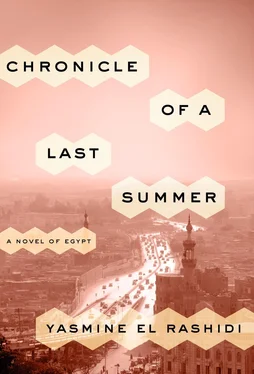It was hard to look at him, really look at him, that day, even though I saw him several times a month. In the gap between May and June, when they had stopped visiting privileges, he seemed to have aged. His voice had deepened, softened. Even his posture seemed changed. He had looked at me at one point, gestured to his face, and told me this is what happens when you wait each day without knowing what you are waiting for. In a way I understood. The aging onset by circumstance happens externally sometimes, but most often the process, the trauma, the real change, is of an inner kind. Dido understood as well as we did that his case was a political one. The charges were baseless. The three of us sat there that day and spoke in roundabout terms of sacrifice. Mama would have called it the luck of the draw. Uncle would have spoken about relativity and assessment. Baba, that day, called it opportunity. We were given twenty minutes, more than the ten I usually got. I imagined it was because Baba was there. We spent them mostly listening to him. He spoke about survival, the lessons he had learned. He mentioned Sonallah Ibrahim, who had found his purpose as a writer in jail. I was surprised to hear Baba quote from Khalil Gibran. At thirty minutes, the prison warden told Baba our time was up. Baba raised his hand as if to ask for pause, and without turning his head said, Two more minutes . The guard looked at him and said, Ya Basha , saluting him and walking off. Baba put his head down slowly and continued to talk. As we got up to leave, I could see tears accumulating at the bottoms of his lids. Dido was also shaken. His face trembled unconcealed as he bit on his lip. Baba held his shoulder and pulled him forward. Hugged him tight. Patted his back. Patted it harder. I heard him whisper that he was proud of him, that he was much braver than he had ever been. On my shoulder Dido whispered to me that he was sorry, then without looking either of us in the eye, he turned around, made a small gesture of goodbye, and disappeared through a door. The guard appeared to escort us out.
—
Mama says she can’t visit Dido. It’s too hard. The pictures in the newspapers are enough. They show him behind bars, in the courtroom cage, skeletal, unkempt. Instead she sends him notes with me, cooks his favorite foods, buys him gifts. I find her in the kitchen one morning painting eggs, coloring them in detail, like miniatures, filling a straw basket. Sham El Nessim , she says. They missed it. Mama still works long hours doing translation jobs, but she has become involved with a community association, writes letters and petitions, joins marches, spends what free time she has walking around the city taking pictures of things that need to change: The garbage, broken pavements, stray dogs and cats. “Can anyone help this poor dog, it needs a home,” she posted on Facebook one day not long ago. On another, “This garbage around our homes, we need to care more. Have we forgotten those eighteen days?” This summer she joined a campaign to save electricity and combat the power cuts. I came home one day to a flyer she had made slipped under my door. Turn the lights off except in the room you are sitting in. Try to switch to power-saving bulbs. Unplug things. Don’t leave your TV on standby. The list went on. She distributed copies to every building on our street, then asked me to scan it to post to Facebook. Although I still see her weariness, I know something in her has shifted. She laughs more, for one. Sometimes when I visit Dido, I show him Mama’s Facebook activism. He laughs and tells me he has been a good example. I nod and joke that maybe the genes are in the family after all.
Dido and I seem to have bridged our differences, the chasm that grew from the disparity of his means of fighting and mine. I think to myself that none of us really seem to be fighting anymore, but don’t have the heart to tell Dido that few of his fellow activists, comrades, show up these days for the protests calling for his freedom. He has become a poster child, but gets more attention internationally than he does here. I wonder what he would say if I told him that. He doesn’t seem to be as critical, as rigid, as he used to be. It might be age, or it might simply be prison tempering him, taking him closer to who he once was. He says it doesn’t take an entire population to change the course of things, and that we each have our calling. I realize how more and more he sounds like Uncle.
—
I still have Baba’s university ID on my desk, propped against a pile of books. Although he hasn’t been back to the house, he mentions it one day. I wonder how he knows, but don’t ask. We are sitting by the pool. He tells me that he knew a revolution would change nothing. I write this into my phone, as I do much else he says. At night I spend hours reading over these notes, letting my mind trail. I stop when the distant echo of music fades. I know this means it is an hour before dawn.
—
I wake up early on the fourth Friday in August. Lying in bed, I try to conjure Granny and Nesma, to will them into presence. Some months ago, Mama had said she felt Granny in her room. I remember years ago when she had said the same about Nesma, approaching the edge of her bed and sitting down. I wasn’t sure if she meant it literally, or if it was about resolution, coming to peace with something, letting go. I think of this more these days, what is contained between walls. I get out of bed and go into the bathroom. My sink is old, with two faucets — hot and cold. I try to scoop water from each one to make it lukewarm. I rinse my face. Brush my teeth. A travel clock sits on my sink. I time two minutes. I dry my face as I walk to the kitchen. Fill the kettle with water from the tap. Push open the shutters and stand looking out onto the backstreet. Nobody is there, and the city feels still. Behind me I listen to the water simmer and boil.
Upstairs I find Mama sitting on the balcony with her laptop, one Dido had given her, typing intensely. She started keeping a journal the day after Sisi was sworn in. It was May. We spent the evening before in the sitting room watching TV. There are dozens of channels now, broadcasting 24/7. Montages have escalated into dramatics. If it weren’t Sisi, it would be terror. They repeat this, reminding us of the past. Don’t forget, these people are the ones who murdered Sadat. Don’t forget what they did to Nasser. Don’t forget Luxor. Don’t forget Kosheh. Don’t forget. Don’t forget. Don’t forget. Don’t forget. Don’t forget. Images of the Luxor massacre. Clips inciting violence. Terrorized Christians. Bearded men butchering, pushing youth off buildings, armed. Figures flash across screens. Killed by terrorists. Massacred. Persecuted. Dead. Images of Sisi. Most people I know voted for him. Mama, Baba, even H. What other choice did we have? If you had given me another option. Me, I had slept through that day, waking up only after the ballots had closed.
Baba called the house the day of the inauguration. He had taken to calling us with news. Switch on the TV, he would say, and we would, without asking why. The broadcast started in the late afternoon, hours of camera roll of an empty hall and desolate palace grounds, which we watched on mute. Eventually cameras focused on the many dignitaries arriving, but the sun had set before the ceremony began, casting the sky a mercurial orange. I got up and went to the kitchen. Walked onto the oval balcony and looked out. It was one of those nights when the building opposite our house was dark, except for the windows, the little outlets of life, the flickering TV screens. I could hear nothing from anywhere except the occasional roar and wind of a passing car, generally at a distance. I stood and watched. Took note of the single apartment still shuttered, the neighbor who had lost her daughter. I hadn’t seen her windows open since. The city seemed to be on pause. I watched and waited, until suddenly, from all directions, the air was filled with the outburst of ululations. From across the street in our neighbors’ building, and from across the river and from the city all around. Fireworks, music, shrieks. I rushed back in. The new president swallowed the screen.
Читать дальше

![Маргарет Миллар - Rose's Last Summer [= The Lively Corpse]](/books/384369/margaret-millar-rose-s-last-summer-the-lively-c-thumb.webp)










